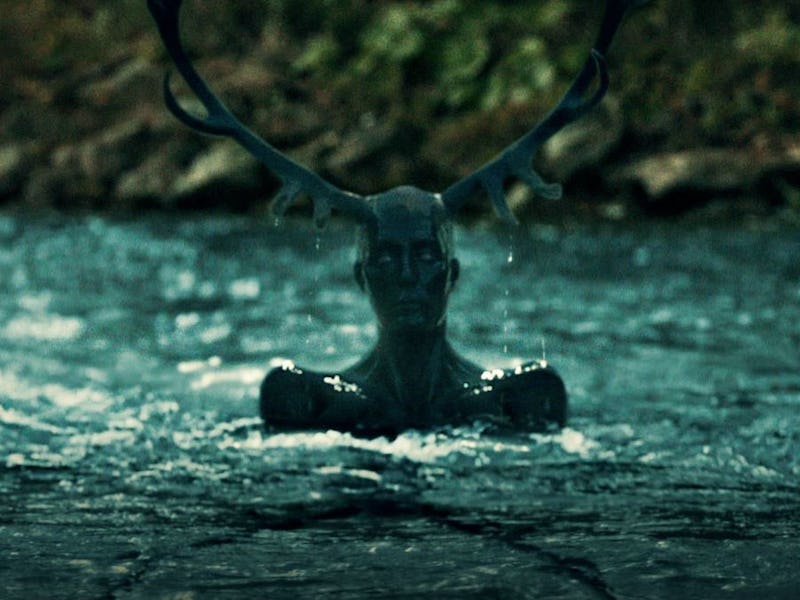A Eulogy for 'Hannibal'
Why the most disturbing show ever to grace NBC's airwaves should be regarded as one of the greatest television shows of the '10s.

The greatest horror television franchise to date ended this past Thursday — presumably. In June, NBC specified that, following the show’s third season, it would no longer air Bryan Fuller’s Hannibal series — the dizzying, hallucinatory show stitched together from elements from Thomas Harris’ books starring serial killer and cannibal chef Hannibal Lecter. Additional references and source material were pulled from the popular movies that the novels inspired — from Silence of the Lambs all the way to lesser-known C-movie Hannibal Rising.
As NBC did not in fact have anything to do with the show’s creation — they only agreed to run it — the cancellation does not categorically mean that the show has to end, but as of yet no other channel or streaming service has renewed it. With Fuller already at work on a new project — a Neil Gaiman adaptation for Starz, American Gods — it seems unlikely that we will see anything more from the series anytime soon, though Fuller is not averse to pursuing it. If we do, that it will be able to re-assemble the same star-studded cast is unknown.
To many, it came as no surprise that Hannibal did not last on NBC — perhaps getting three seasons aired was a miracle. It was, from the beginning, seemingly designed to be a cult favorite. As it went on, the series (which aired late on Thursday) became increasingly mannered, its sparse narrative often subsumed by hallucinations and complex dream logic. By the bifurcated third season, it had become a passion play. Hannibal’s escape to Italy, Will Graham’s hunt to capture him, and millionaire Mason Verger’s quest to kill him was articulated through episodes with little dialogue, portraying the characters lost in private holes of hallucinatory obsession. Additionally, there was the more surface-level fact that the show was, from the outset, almost objectively too gory for network TV. It also required an audience with the stomach and mental wherewithal to deal with the fact that Hannibal’s lovingly prepared, human-based meals looked delicious.
But to those of us with a high tolerance for the gruesome, a love of ambitious aesthetic experiments, commanding and poker-faced acting, pitch-black humor and invasive, hair-raising soundtracks, there was nothing better than this show. It was at turns appealing, pulpy, and profound, driven by characters as much as its visual sensibility, and excellent with flouting expectations, even when source material was familiar to many viewers. By the end, it seemed to resemble little else on TV; people who assumed a Hannibal show on NBC would be in the Dexter lineage couldn’t have been more wrong.
Surprisingly, both Hugh Dancy (Graham) and Mads Mikkelsen (Lecter) came to define their legendary characters better than any of their counterparts in film. Even despite Dancy’s sometimes-irritatingly unflappable demeanor, no one else has made Graham’s tortured psychology as the Great Empathizer so convincing and — when required — frightening. Mikkelsen had ten times the charm of even Anthony Hopkins in Silence of the Lambs, and his accent and demeanor more effectively encapsulates Harris’ backstory for the character: a child born of Lithuanian royalty and scarred by trauma.
Side characters were drawn effectively and often humorously (particularly the morally bankrupt doctors Frederick Chilton and Eddie Izzard’s sociopathic Abel Gideon) and the primary supporting cast members (Fishburne’s Jack Crawford, Dhavernas’ Ilana Blum, and Gillian Anderson’s darkly sardonic Bedelia Du Maurier were appropriately stolid in demeanor — emotional only when absolutely required.
Hannibal ended in an appropriate flurry of fever nightmares and a Reservoir Dogs-or-Coriolanus-level bloodbath; therefore, it was in line with the show’s other season finales. Though Lecter and Graham wrestle and plunge off a cliff together like Professor Moriarty and Sherlock Holmes, we don’t see the waves in the water. A seasoned TV and horror film fans knows well that this by no means signifies permanent demise. Also, Fuller acknowledged to Vulture that a potential Season Four would be “a reexamination and reinterpretation of the Will Graham–Hannibal Lecter relationship.” Unless it took place in the past, in some afterlife-like dream state or following some sort of reincarnation (not impossible for this show), this would mean the two survived the plunge.
And yet, knowing that Hannibal is probably in the can for good, the episode was an appropriate ending: Graham and Lecter accept their co-dependent relationship in a suicidal, dying embrace. Au revoir, teacups, tongue-eating and endless Lecter-Graham tête-à-têtes — at least until the next, doubtlessly inferior reboot of the Hannibal Lecter story.